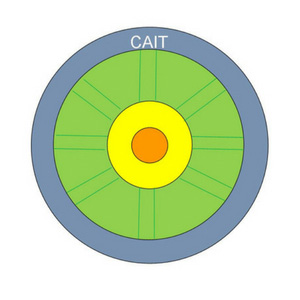
Care staff from across Sunderland have graduated after completing six months of training which will improve the experiences of people living with dementia.
Northumberland, Tyne and Wear NHS Foundation Trust (NTW), a provider of mental health and disability services has worked in collaboration with Tyne and Wear Care Alliance to deliver Communication and Interaction Training (CAIT). So far 46 care homes as well as elderly wards at NTW have graduated from the programme.
The CAIT training which is commissioned by Sunderland Clinical Commissioning Group is now in its second year. It teaches care staff how to better interact with people living with dementia in order to reduce distress.
Professor Ian James, Consultant Clinical Psychologist and Laura Gibbons, Community Practitioner deliver the person centred teaching programme which is built on basic communication principles and includes advanced evidence based treatment strategies for the management of behaviours that challenge.
We felt proud to facilitate this year’s CAIT graduation day which was attended by 12 Sunderland care home staff and their managers and five NTW staff. All together 27 participants have completed the CAIT training this year and can proudly call themselves ‘Communication Leads’.
Laura GibbonsCommunity Practitioner
Laura said: “The CAIT project work continues to develop and grow; all five NTW organic inpatient wards and 22 care homes in Sunderland now have 55 trained communication leads in place who will be working with their colleagues to improve dementia care practices and the well-being of people living with dementia.
“I would like to thank our funders Sunderland Clinical Commissioning Group, Network Development Officer Angela Richardson at Tyne and Wear Care Alliance and Cllr Stuart Porthouse for coming along to the graduation day and sharing in our success and achievement”
All staff who graduated had attended a one day course and then participated in eight four hour sessions to further develop their skills and give them a better understanding of what it’s like to live with dementia.
A train the trainer manual accompanied this training. Each communication lead was provided with a workbook and a CAIT manual, which provided teaching materials, exercises and guidance notes. The workbook was completed by the learners during the supervision sessions; this taught the learners the skills to deliver the material to others.
